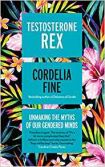Testosterone Rex: Unmaking the Myths of Our Gendered Minds by Cordelia Fine
I really want to believe that starting Testosterone Rex with an anecdote involving a key-ring made of canine testicles was less of a puerile opening gambit and more of a consciously chosen attempt to make me believe that Cordelia Fine's new book is going to deliver the goods.
| Testosterone Rex: Unmaking the Myths of Our Gendered Minds by Cordelia Fine | |
|
| |
| Category: Popular Science | |
| Reviewer: Magda Healey | |
| Summary: Entertaining, passionate and well evidenced, if definitely with a partisan agenda, argument for leaving the human in human nature and against simplified ev-psych just-so-stories of testosterone and cheap sperm driven males and coy, chaste and risk-averse females, Testosterone Rex is recommended for anybody interested in not just in gender science and gender politics, but social science in general, human nature and the many forms in which our cultural conditioning shapes not just our behaviours but also the way we study them. | |
| Buy? Yes | Borrow? Yes |
| Pages: 256 | Date: March 2017 |
| Publisher: Icon Books | |
| External links: Author's website | |
| ISBN: 978-1785781612 | |
| Video:
| |
And despite the introduction that did its best to compete with Tumblrs created by US-college-student grrrl power social justice warriors, Testosterone Rex proved to deliver much more of dog's bollocks than dog's dinner for this reader.
Testosterone Rex continues the task Fine began in Delusions of Gender, which is to examine the evidence for and the assumptions of biologically-deterministic notion of a 'gendered mind'. Testosterone Rex presents more evidence that at its best refutes and at the least, makes one question the currently popular narrative of biologically-deterministic gender: the idea that male and female minds, and consequently, male and female patterns of behaviour are 'naturally' distinct, that this distinction is hard wired by the individual's developmental path which leads from the chromosomes to the gonads to the hormones to the brains to the minds and eventually, to behavioural patterns.
Fine's argument is woven around a different basic idea: that the possession or absence of Y chromosome and other genetic components of sex doesn't in itself dictate a particular way of behaving (…) and neither sex has a monopoly on certain characteristics.
There is no such a thing as distinctly male psyche created by the Y chromosome via testosterone magic. The unit price of sperm might be cheap, but sex certainly isn't as cheap for males of numerous species as it would appear from the biological price of a single spermatozoon, and it's even less cheap for human men. Making hundred babies with a hundred different women in a year is almost impossible (not that we really need a scientist to tell us that) and even simply reproductively outperforming a man in a sexually active relationship with one woman via the one-night stand route requires much more effort and more pure luck than one would suspect. A harem might be a very un-natural indeed creation brought to life by the socio-pathology of extreme inequalities of developed agricultural society rather than a universal human male aspiration. Humans don't do that much mating after all. And a Maserati is much less like a peacock's tail than we are sometimes led to believe.
The data Fine quotes and the arguments she employs it in is fascinating. I don't know quite enough about the subject to judge how selective she was in her choices. At least at times she seems to chooses to fight straw men and fish for red herrings, but ultimately the data is less important than it might seem. A lot of discussion around what could be deemed gender science involves proposing what should be under the guise of describing what is, but Testosterone Rex does more than uncover this bias in an entertaining way (even when it applies to fruit fly research).
One of the most common, and most valid, arguments used by the critics of evolutionary psychology is the claim that many ev-psych arguments are merely just-so-stories, mere speculation with neither experimental nor properly gathered observational basis. To requote one of Fine's sources, we need not only better data but better stories, and to discuss and research this elusive thing called human nature we need to agree on what 'natural human' might be like.
Ultimately, and beyond any discussion of biologically and/or culturally determined behavioural difference between the sexes, Testosterone Rex is a passionate argument for leaving the 'human' - social, psychological, cultural and economic - in 'human nature' rather than stripping it off to supposedly reveal some core of innate biological truth that bears no resemblance to the way human beings have ever behaved.
Fine carries this argument in her unique style, occasionally infuriating (but I promise you that the intro is the worst), often entertaining, but always engaging. The best part of Testosterone Rex are those that report on particular studies or specific topics and unpick them in more detail: from the fruit fly breeding to human females and males risk taking to bran cell development in rats to demonstrating that at least in some species testosterone levels - and the size of the testes - are actually socially constructed (read if you don't believe me).
Fine also succeeds beautifully in making the reader question the seemingly obvious assumptions: Why should specialized neural sex circuits create overall differing patterns of mind and behaviour? What does it even mean to have a male, or male-like brain if the there is no clear and distinct patterns of differences and 'masculinity' and 'femininity' are not ends of the same continuum? Are females really less competitive than males? What exactly is risk taking? How different, compared to other species, human males and females really are? Would gender parity in the financial industry have avoided the 2008 crash? Are typical group characteristics also innately fixed and adaptive? And, perhaps more importantly, even if some behavioural patterns are reflection of evolved adaptations, how much does it matter for how we construct our society?
There are tangents, often entertaining but distracting, perhaps too many, and I personally think that the book's polemic thrust detracts from its information aspect. But whether you are a total social constructionist, or a hard-line believer in distinct male and female brains, or sitting right on the fence dividing the gender-science playing field, if you have any interest in human behaviour, society, psychology and especially sexuality, you should find Testosterone Rex a stimulating read.
In the same subject area, Duels and Duets: Why Men and Women Talk So Differently by John L Locke is a treatise on the testosterone-is-king argument. You might want to partake of The Whole Woman by Germaine Greer after reading that, just for contrast.
Himglish and Femalese: Why Women Don't Get Why Men Don't Get Them by Jean Hannah Edelstein looks at current social trends in gender relations, while A Woman Looking at Men Looking at Women: Essays on Art, Sex and the Mind by Siri Hustvedt discusses gender and sex, minds and brain and art and science while seeking unity rather than discord.
Steven Pinker is at his best discussing language, but has fascinating things to say about human nature in general too.
Why Women Have Sex: Understanding Sexual Motivation from Adventure to Revenge (and Everything in Between), co-authored by David Buss, the best known ev-psych researcher of human sexual behaviour, despite the title that curiously suggests it's only female participation in sex that needs explanation, is also well worth a read, while The Machines of Sex Research: Technology and the Politics of Identity, 1945-1985 by Donna J Drucker look at sexual behaviour research from a technical and philosophically academic perspective.
Please share on: ![]() Facebook,
Facebook, ![]() Twitter and
Twitter and
![]() Instagram
Instagram
![]() You can read more book reviews or buy Testosterone Rex: Unmaking the Myths of Our Gendered Minds by Cordelia Fine at Amazon.co.uk Amazon currently charges £2.99 for standard delivery for orders under £20, over which delivery is free.
You can read more book reviews or buy Testosterone Rex: Unmaking the Myths of Our Gendered Minds by Cordelia Fine at Amazon.co.uk Amazon currently charges £2.99 for standard delivery for orders under £20, over which delivery is free.
![]() You can read more book reviews or buy Testosterone Rex: Unmaking the Myths of Our Gendered Minds by Cordelia Fine at Amazon.com.
You can read more book reviews or buy Testosterone Rex: Unmaking the Myths of Our Gendered Minds by Cordelia Fine at Amazon.com.
Comments
Like to comment on this review?
Just send us an email and we'll put the best up on the site.

